Introduction
Website design has undergone a significant transformation with the introduction of artificial intelligence (AI). AI-powered website design tools have made it easier than ever to create stunning, functional websites with minimal effort. This comprehensive guide explores the top 10 AI website design tools that are revolutionizing web development, detailing their features, functionality, and benefits.
The Rise of AI in Website Design
AI in website design leverages advanced algorithms and machine learning to automate the design process. These tools can analyze user input, suggest design elements, and even create complete websites based on specific requirements. The rise of AI in this field has democratized web design, making it accessible to everyone, from beginners to professional designers.
Top 10 AI Website Design Tools
🥇 1. Wix ADI (Artificial Design Intelligence)
Website: https://www.wix.com
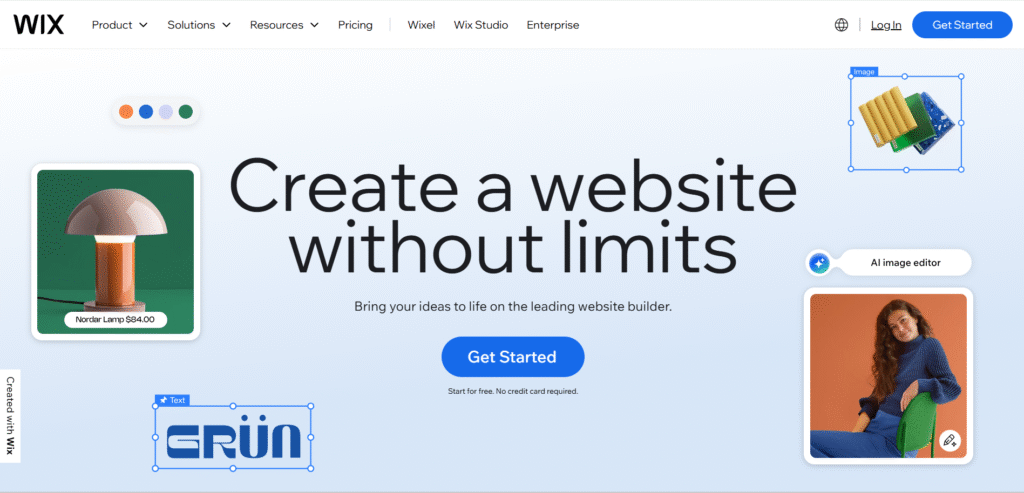
Description:
Wix ADI is one of the earliest and most advanced AI website builders. You simply answer a few questions about your business, and Wix automatically creates a complete website — with layout, text, and images. The system learns your preferences (color, font, layout) and tailors a professional design that’s instantly editable.
Best For: Small business owners, personal portfolios, and non-technical users.
Highlights:
- Auto-generates websites with minimal input
- AI image recommendations and content suggestions
- Drag-and-drop editing after generation
- Integrates with Wix SEO, Analytics, and eCommerce
🥈 2. Squarespace Blueprint AI
Website: https://www.squarespace.com
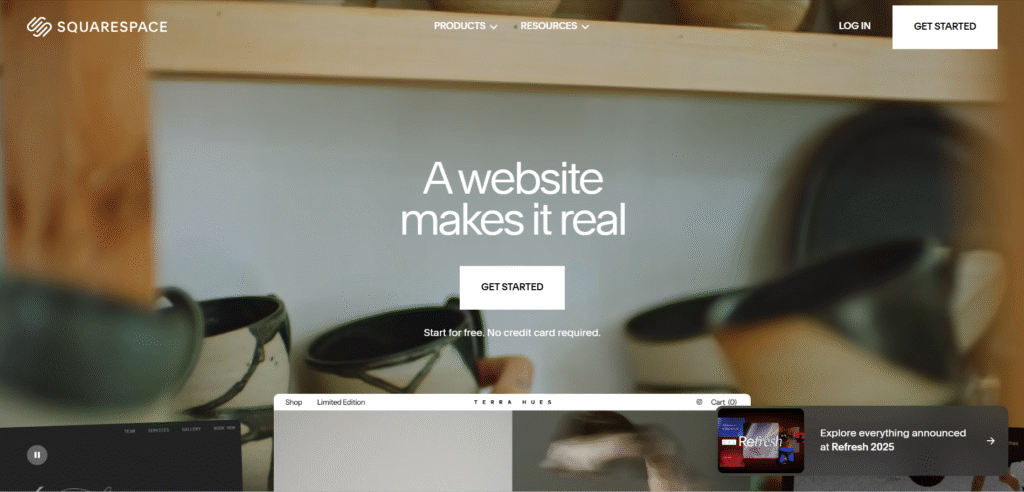
Description:
Squarespace’s Blueprint AI lets users create “launch-ready” websites in minutes. You provide a few prompts about your goals and business type, and the AI automatically generates a customized layout, navigation, and brand color palette. Combined with Squarespace’s polished templates, this ensures stunning, minimal, and mobile-optimized sites.
Best For: Creatives, photographers, and entrepreneurs who want design-first websites.
Highlights:
- AI-driven layout and style generation
- Smart content placement based on intent
- Built-in eCommerce and SEO tools
- Clean, artistic, professional aesthetics
🥉 3. Framer AI
Website: https://www.framer.com
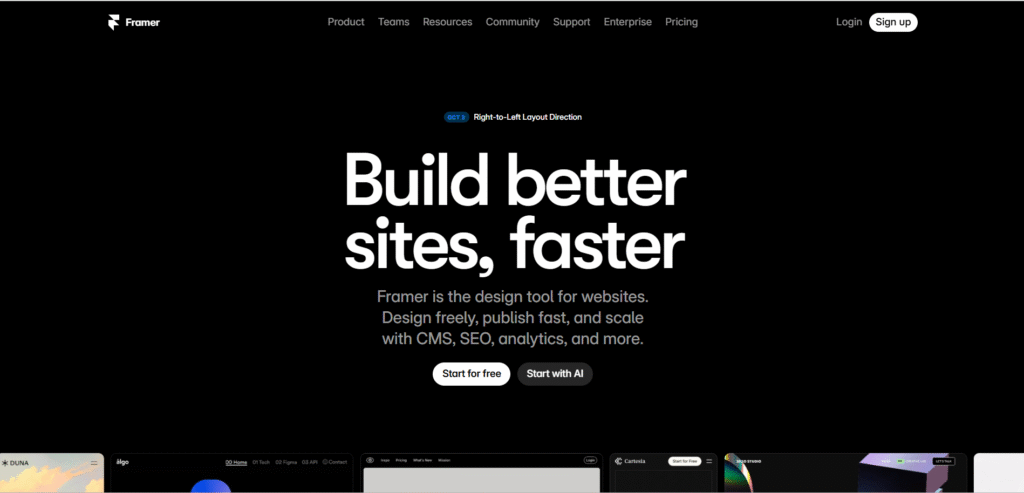
Description:
Framer AI allows you to build full websites from text prompts. You describe your website’s purpose, and Framer instantly designs responsive layouts, typography, and visuals — editable in real time. It’s great for designers who want AI to create a base, then manually refine for pixel-perfect control.
Best For: Designers & developers who want flexibility with speed.
Highlights:
- Generate sites with natural language prompts
- Real-time visual editor for refinement
- Clean, SEO-friendly code export
- Integrates animations and interactions easily
4. TeleportHQ
Website: https://teleporthq.io
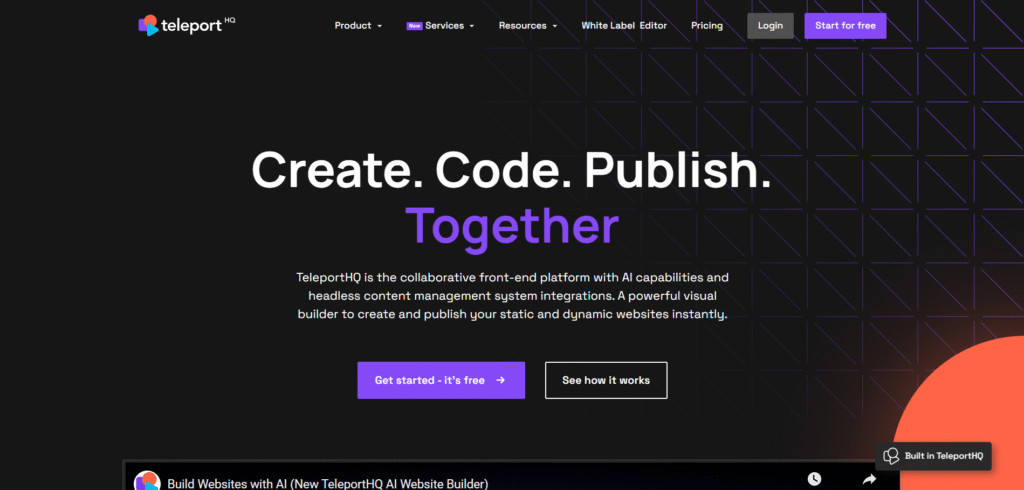
Description:
TeleportHQ is an AI-powered front-end design platform that turns text prompts or wireframes into live websites. It uses machine learning to interpret design intent and auto-generate production-ready code (HTML, CSS, JS). You can export directly to frameworks like React, Next.js, or Vue.
Best For: Developers, agencies, and UI/UX professionals.
Highlights:
- Generate responsive code from sketches or prompts
- AI layout engine for UI structure
- Code export to major frameworks
- Collaborative workspace for teams
5. CodeDesign.ai
Website: https://codedesign.ai
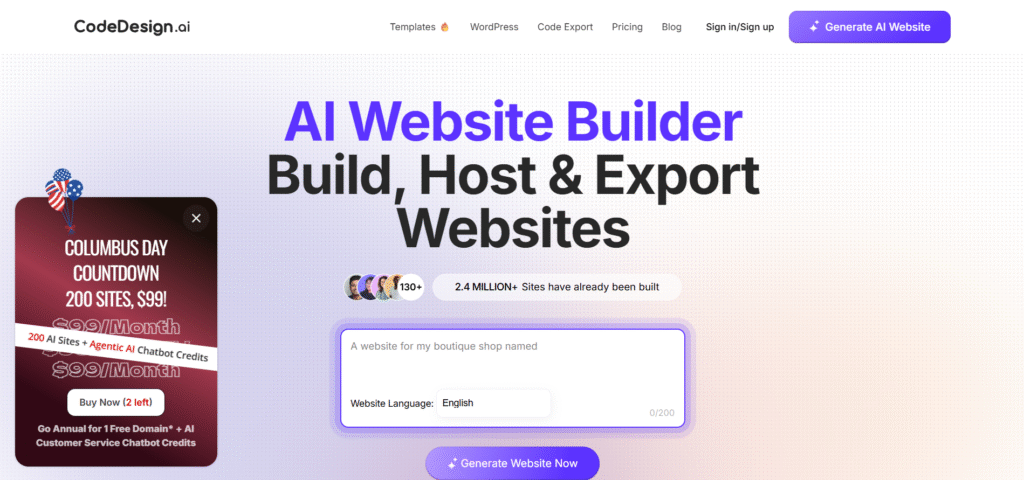
Description:
CodeDesign.ai blends AI-powered layout design with content automation. It helps you generate site wireframes, color palettes, and written content simultaneously. Ideal for marketing teams and freelancers, it speeds up the entire creative process — from brainstorming to publishing.
Best For: Digital agencies and freelancers building client sites.
Highlights:
- Text-to-website generation
- AI copywriting and layout matching
- Instant deployment or export
- Great for multi-page websites
6. Relume
Website: https://www.relume.io
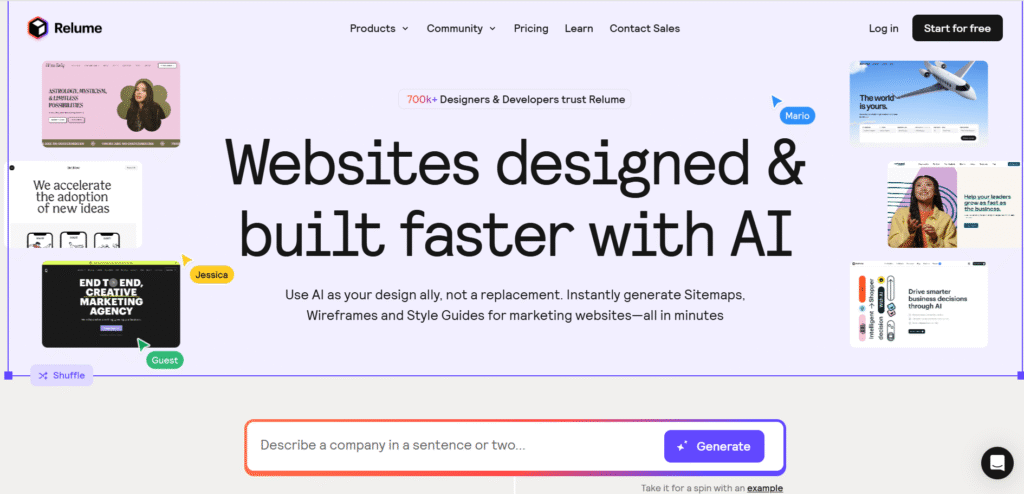
Description:
Relume revolutionizes UX/UI prototyping by generating site maps and wireframes using AI. You can describe your brand or product, and Relume creates a ready-to-edit structure that integrates perfectly with Figma or Webflow. It’s perfect for designers who need to quickly visualize or pitch layouts before building them.
Best For: UX designers, agencies, and Webflow developers.
Highlights:
- Generate sitemaps, wireframes, and components
- Integration with Figma & Webflow
- AI-powered copy suggestions
- Accelerates client proposal workflows
7. Duda AI Website Builder
Website: https://www.duda.co
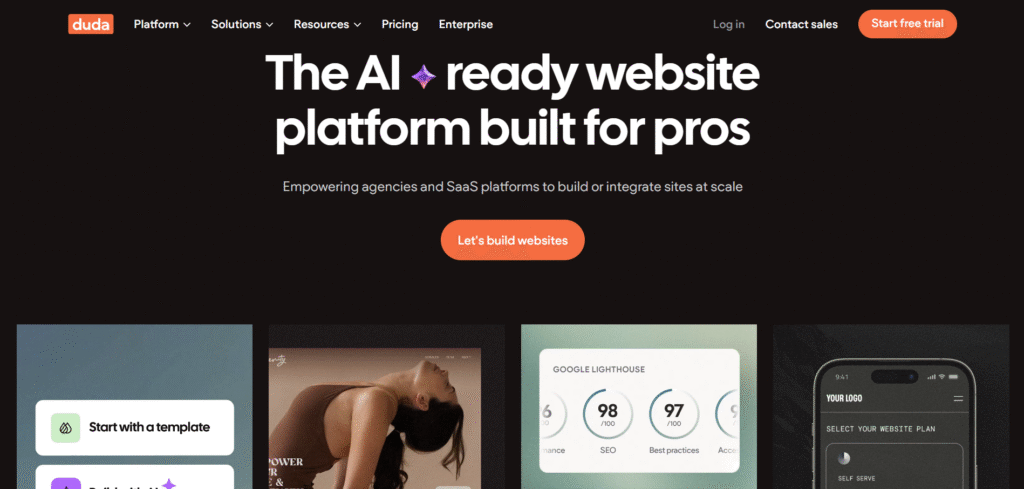
Description:
Duda is a professional website builder platform used by digital agencies. Its AI features include automated content creation, SEO metadata, and layout recommendations. The AI can also optimize text for readability and tone, creating agency-grade sites at scale.
Best For: Agencies managing multiple clients.
Highlights:
- AI layout and content suggestions
- Dynamic site personalization
- Team collaboration & white labeling
- Integrates with CRM and eCommerce
8. Readdy.ai
Website: https://readdy.ai
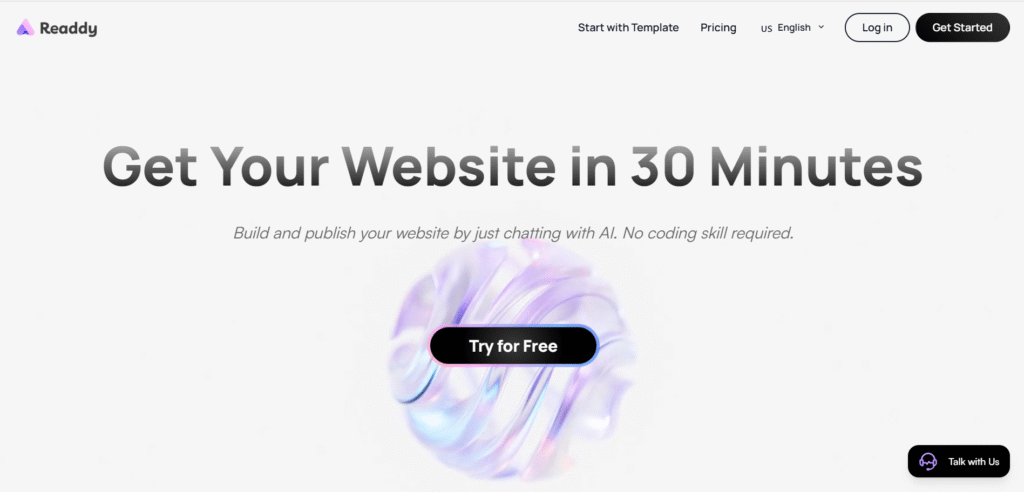
Description:
Readdy.ai is a conversational AI website builder that creates sites from natural chat. You simply describe your business or brand, and Readdy designs, writes, and structures your entire website. It’s ideal for marketers who prefer a dialogue-based setup instead of templates.
Best For: Entrepreneurs, startups, and small business owners.
Highlights:
- Voice or text prompt-based website generation
- AI-written copy, layout, and visuals
- Editable, responsive output
- Fastest turnaround among AI builders
9. Mobirise AI
Website: https://mobirise.com
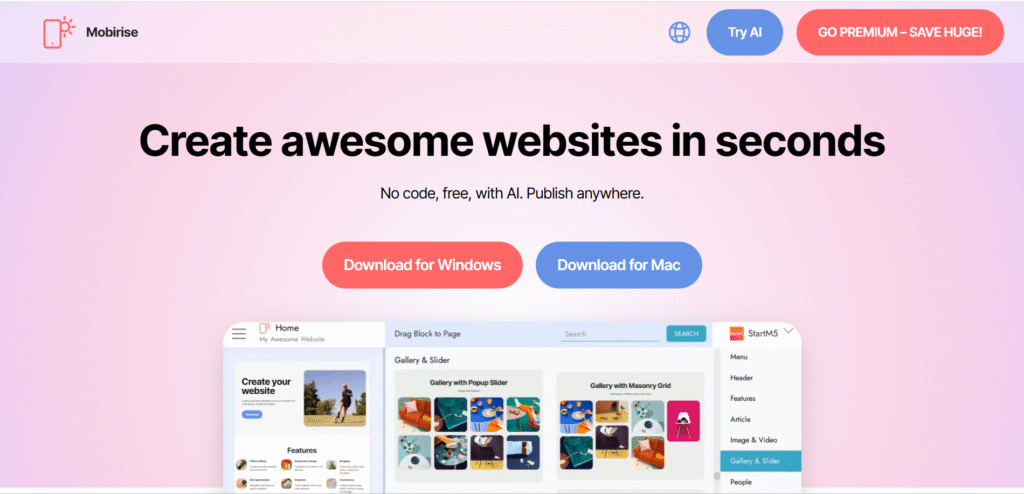
Description:
Mobirise AI is a no-code offline web design app that adds AI page generation. It runs locally (great for privacy-conscious users) and can automatically generate landing pages or multi-page layouts. You can then customize content blocks visually without any code.
Best For: Designers who prefer offline tools or local hosting.
Highlights:
- Works without internet access
- Drag-and-drop page builder
- Lightweight, Bootstrap-based output
- Great for freelancers & small businesses
10. Durable AI Website Builder
Website: https://durable.co
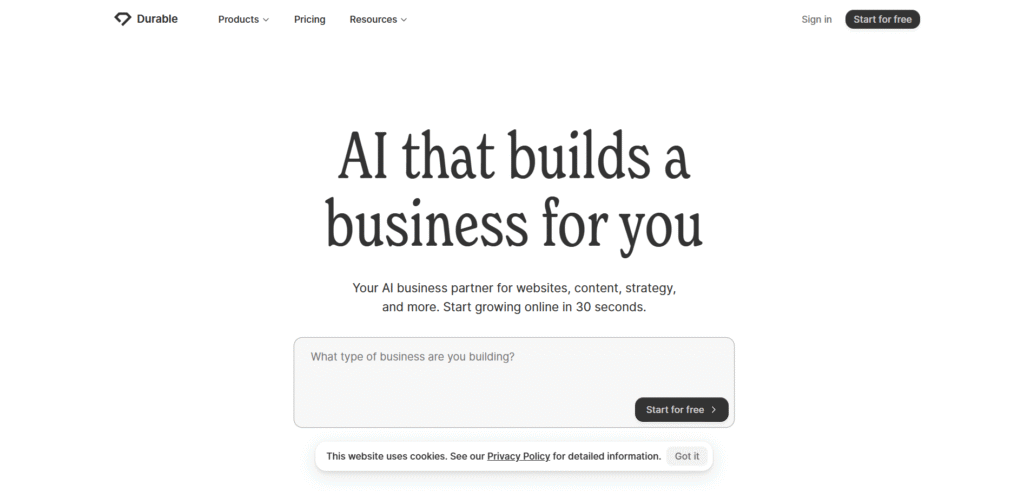
Description:
Durable AI is a true text-to-website builder — you describe your business in a few sentences, and within 30 seconds, it generates a full live website with text, photos, and CTAs. It even adds basic branding, analytics, and SEO setup automatically.
Best For: Entrepreneurs, freelancers, and agencies needing instant websites.
Highlights:
- One-click full site generation
- Auto copy, layout, and branding
- Built-in CRM and contact form tools
- Perfect for quick MVP launches
Comparison Table of Top AI Website Design Tools
| Tool | Core Focus | Best For | Key AI Features | Website |
|---|---|---|---|---|
| Wix ADI | Full AI website generation | Non-tech users, small biz | Layout, content & color matching | wix.com |
| Squarespace AI | Style-driven web creation | Creatives, photographers | Smart layouts, aesthetic polish | squarespace.com |
| Framer AI | Prompt-to-website builder | Designers & developers | Text-to-site, real-time editor | framer.com |
| TeleportHQ | AI front-end code generation | Developers, UX teams | Prompt-to-React/HTML code | teleporthq.io |
| CodeDesign.ai | AI layout + copywriting | Agencies, freelancers | Wireframes + text automation | codedesign.ai |
| Relume | AI wireframes & sitemaps | UX/UI designers | Sitemap generation, Figma sync | relume.io |
| Duda AI | Scalable site automation | Agencies | AI content + personalization | duda.co |
| Readdy.ai | Chat-based builder | Entrepreneurs | Voice/text website creation | readdy.ai |
| Mobirise AI | Offline AI web builder | Freelancers, small biz | No-code + local hosting | mobirise.com |
| Durable AI | One-click instant sites | Startups & solopreneurs | Auto design, text, SEO | durable.co |
Choosing the Right AI Website Design Tool for You
Selecting the right AI website design tool depends on your specific needs and preferences. For quick and easy website creation with personalized design, Wix ADI and Jimdo Dolphin are excellent choices. Bookmark AiDA and Zyro offer robust e-commerce integration, making them ideal for online stores. For high-quality templates and comprehensive design tools, consider Squarespace and Adobe Sensei. Evaluate the features, pros, and cons of each tool to find the best fit for your website design requirements.
FAQs
What are AI website design tools?
AI website design tools use artificial intelligence to automate and enhance the website creation process. These tools can generate design suggestions, automate layout adjustments, and even create entire websites based on user input.
Are AI website design tools free?
Many AI website design tools offer free versions with basic features. However, access to advanced tools and functionalities usually requires a subscription or one-time purchase.
How do AI website design tools work?
AI website design tools work by analyzing user input and using machine learning algorithms to generate design elements and layouts. They can automate various aspects of website creation, making the process faster and more efficient.
Which AI website design tool is best for beginners?
For beginners, Wix ADI and Jimdo Dolphin are great choices due to their user-friendly interfaces and comprehensive features that do not require advanced technical skills.
Can AI website design tools improve SEO?
Yes, many AI website design tools are designed to improve SEO by optimizing website structure, keywords, and content, helping your site rank higher on search engines.
Do AI website design tools support e-commerce?
Yes, several AI website design tools, such as Bookmark AiDA and Zyro, offer e-commerce integration, allowing you to create and manage online stores effectively.
Conclusion
AI website design tools have revolutionized the way websites are created, making it easier, faster, and more efficient. Whether you are a professional web designer, a small business owner, or a beginner, these tools can significantly enhance your website design process. Explore the features, benefits, and potential of each tool to find the perfect match for your website design needs.



